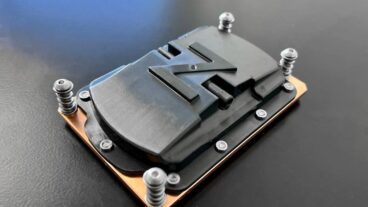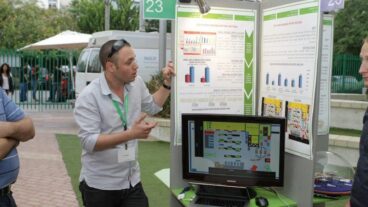“Israel has some of the best automotive technologies in the world,” says Paul Linden. He should know. Linden has over 20 years experience with some of the top car manufacturers, including GM, Ford and Toyota.
Linden, a native of Toronto, worked in six continents before moving to Israel. Currently Automotive Innovation Manager for Emcol Engineering and Manufacturing Co. Ltd, based in Ashdod, he is heading the effort to expand activities into advanced automotive products. Linden sees the potential growth of Israel’s automotive parts and systems exports climbing to $1 billion in the next five years and is moving into high gear to make that growth happen.
Israel is already a choice source for quality aluminum-magnesium castings and steel assemblies for Jaguar, MB, BMW, GM, VW, Peugeot, and Volvo. Who would have thought that Jaguar gets its engine heads in Israel? Or, that Audi buys engine valve springs from Israel?
The goal is to make the entire global automotive industry aware that Israel is also the place for innovative materials, thermoplastic systems, advanced electronics and new technologies.
“Operating through the Israel Export Institute, we participated in a Stuttgart exhibition that demonstrated 14 all-new Israel technologies for the automotive industry. The event was co-hosted by MBTech, a division of Mercedes-Benz,” says Linden.
Why outsource in Israel? In a presentation to Chrysler this month, Linden pointed out four benefits: better technical solutions, lower costs, reliable on time delivery, high-quality parts.
One of Linden’s first successes in Israel was introducing Raviv carbon fabric heated seats. The system, designed and manufactured at Kibbutz Revivim in the Negev, proved itself during a drive in freezing Michigan weather with Detroit automotive executives. The system is now in development for introduction with a major automaker.
Israeli is years ahead in materials know-how. Ready for market is a new hardened fabric, tough and lightweight, that features a soft, luxurious-to-the-touch material on one side, and hard plastic shell on the other. TexoPlast’s product stirred a lot of excitement when it was demonstrated to two manufacturers in Europe last month. “We suggested it for interior trim, but when they heard about its features [European commercial vehicle manufacturer] MAN, said that it was perfect solution for the cabin floor,” said Linden. “Here is a product that impacts design.”
Lincoln enhances its cars with super-quiet inner door panels made by Polyram and Arkal Industries, and a luxury seating fabric produced by Magical Industries, owned by Flocktex of Kiryat Malachi. The high-end fabric, called Impala, which feels like leather and is anti-stain, has earned high marks in durability tests. Another company, Adionim has developed a super thin, low cost magnesium coating able to withstand extreme weathering and hundreds of hours of salt spray. Adionim has also developed titanium coatings for engine pistons that provide a better seal for improved fuel economy. Ben Gurion University of the Negev is developing a strong, light-weight magnesium foam that is, says Linden, “ideal for crash absorption and occupant protection.”
Electronics – the multiplier
Electronics will be the industry multiplier of the future. “Electronics used to be 15 percent of total car cost but it is edging up to 35%. “Israel is in place to become a leader in this niche,” said Linden.
Driver vision and security are strong categories. Xenlight’s super efficient Xenon headlamp system, “better than Mitsubishi’s,” has already been picked up to enhance a major European luxury car. IPU Industries is developing a 360 degree vision system for cars that combines thermal imaging, radar warning and video cam designed to distinguish and identify child pedestrians, adult pedestrians, animals and other objects on possible collision course. Elbit and MobilEye are also developing driver vision systems for Ford, while Idesia uses driver heartbeat for a biometric-based security system and driver health monitor.
IPU recently received a major contract to provide antennas, wiring and power distribution units (PDU) for a major Japanese manufacturer. A kind of intelligent fuse box, the PDU monitors and supports auxiliary applications such as security systems, audio, GPS, satellite TV, coffee warmer, and fog lamps. IPU’s product is easy to assemble, and operates safely with a minimal energy loss.
New Israeli “vehicle to environment” communications systems including satellite TV reception promise to change the whole driving experience. Perks to performance include engine control modules, an electronic voltage regulator, a system to monitor fluid quality and temperature (using microwave transmissions).
Israeli companies also offer electronic equipment to improve the accuracy, quality and efficiencies of vehicle production.
In addition, there’s the strategic decision taken by the Israeli government to push forward the development of the electric car for mass transportation. Shai Agassi, the force behind Project Better Place, envisions the electric car as a viable alternative to gasoline-guzzling vehicles. Linden helped to develop the cooperative strategy for advanced electronics with Renault, Project Better Place’s French partner, in building the prototype in Israel. Last month, Agassi pitched his vision to the U. S. Congress.
Besides helping to rev up Israel’s automotive products industry to reach $1 billion in exports, Linden also has his own dream. “The Arava [desert] is the perfect venue for vehicle testing. It is the hottest, lowest, and most severe test environment in the world. It is the ideal location for vehicle and system testing,” he says.
For more information about new Israeli technologies to improve performance, engineering, design, and safety for the automotive industry, check Paul Linden’s weekly blog at www.AutomotiveInnovations.info, also accessible via Linked In.com, where most of Israel’s automotive developers meet online to help each other along.












